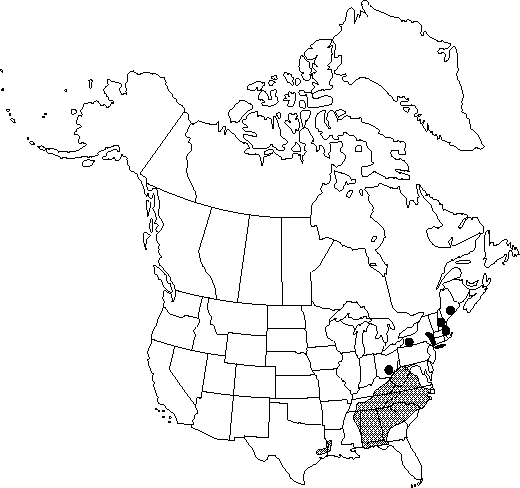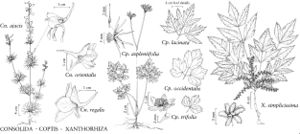Xanthorhiza simplicissima
Arbust. Amer., 167. 1785.
Stems 20-70 cm, 3-6mm diam.; bark smooth, ringed with leaf-scars, inner bark yellow. Leaves clustered near stem apex, to 18cm; leaflets 3-5, 2.5-10 × 2-8 cm, sessile to short-petiolulate. Inflorescences broad-paniculate, arising from cluster of leaves, 6-21 cm, short-pilose; pedicel 2-5 mm. Flowers: sepals spreading, acuminate; petals with nectary transversely oblong, 2-lobed. Follicles yellowish-brown, glossy, somewhat inflated, 3-4 mm, distally ciliate. 2n=36.
Phenology: Flowering spring–summer (Apr–May).
Habitat: Shaded stream banks, moist woods, thickets, and rocky ledges
Elevation: 0-1200 m
Distribution

Ala., Fla., Ga., Ky., La., Maine, Md., Mass., Miss., N.H., N.Y., N.C., Ohio, S.C., Tenn., Tex., Vt., Va., W.Va.
Discussion
Xanthorhiza simplicissima is cultivated as an effective ground cover in moist soils. In the northeastern and midwestern United States it occasionally escapes from cultivation, and either persists or becomes established. In southeastern Texas and western Louisiana the species is apparently native, though infrequent. The leaves bear a striking resemblance to those of celery, hence apiifolia, the epithet in synonymy.
The yellow inner bark and roots contain a bitter principle; the roots have been used medicinally and in making yellow dye. Bundles of yellowroot are widely sold in Alabama and Georgia for treatment of gastrointestinal disorders and fever blisters (R. D. Whetstone, pers. comm.).
Native Americans used Xanthorhiza simplicissima medicinally to treat ulcerated stomachs, colds, jaundice, piles, sore mouth, sore throat, cancer, and cramps, and as a blood tonic (D. E. Moerman 1986).
Selected References
None.
